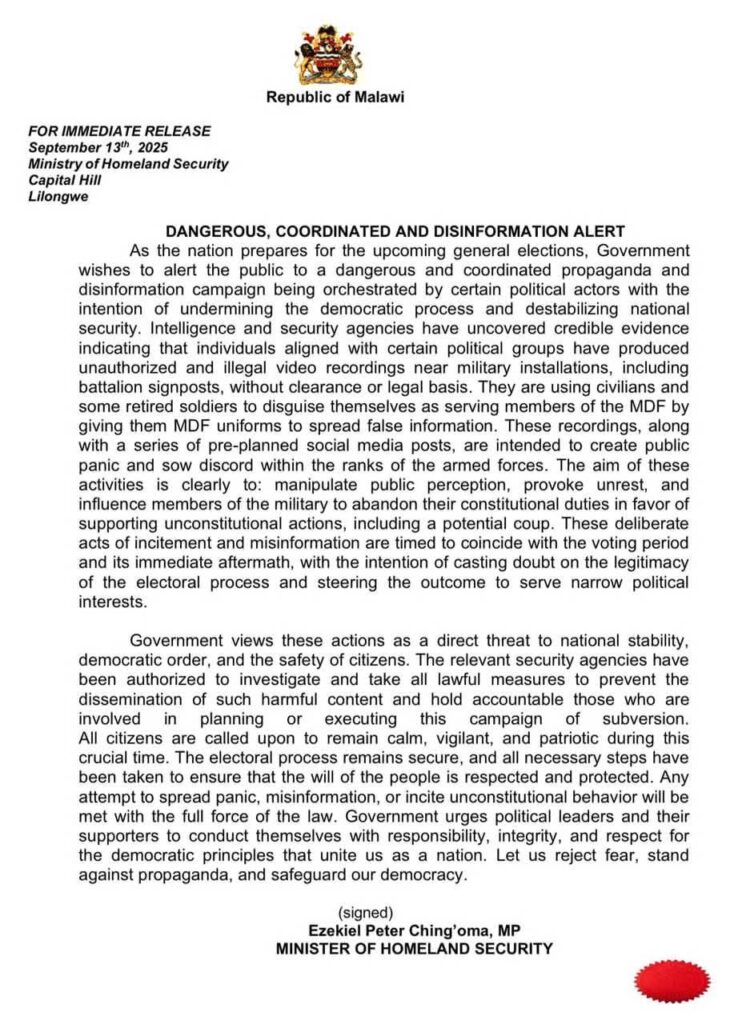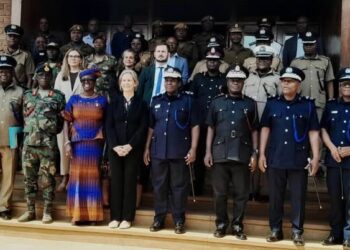With just days before Malawians head to the polls, the Ministry of Homeland Security has sounded a stark warning to a “dangerous and coordinated propaganda campaign” masterminded by the opposition as part of a broader scheme to destabilize the nation, discredit the electoral process, and manipulate public opinion.
In a statement released Saturday, Homeland Security Minister Ezekiel Ching’oma revealed that intelligence agencies had uncovered evidence of civilians and retired soldiers being dressed in Malawi Defence Force (MDF) uniforms planning to record with the intention of inciting panic, sow divisions within the military, and undermine the credibility of the Tuesday elections.
These recordings, he said, were set to be disseminated on social media alongside carefully timed disinformation materials.
“These recordings, along with a series of pre-planned social media posts, are intended to create public panic, sow discord within the ranks of the armed forces, and undermine the credibility of the elections,” Ching’oma said.
The minister’s statement confirms what many security analysts and civil society leaders have been warning for months that the Democratic Progressive Party (DPP), facing internal disunity and waning popularity, has resorted to underhanded tactics that risk plunging Malawi into chaos.

The Minister’s statement has not mentioned the DPP directly.
However, intelligence briefings and whistleblower accounts sourced by The Pangolin Online suggest that the DPP has been actively coordinating a shadowy “taskforce on violence” since early 2025.
Comprised of loyalists, former security operatives, and hired muscle, the taskforce is alleged to have been tasked with three main objectives: intimidating political opponents through targeted attacks on campaign rallies and convoys; spreading disinformation and propaganda to weaken trust in state institutions; and orchestrating post-election disruptions in the event of defeat at the ballot box.
Reports indicate that the taskforce operates under the direction of senior DPP figures, with funding streams traced to both party coffers and business allies.
Party insiders claim that meetings were held in Blantyre and Mangochi earlier this year, where strategies for mobilizing “youth cadres” were discussed.
According to one security source, the plan is to “weaponize confusion” and deploying violence and propaganda.
“They know Malawians are tired of violence, but fear still works. If you can’t win the ballot cleanly, then make the country ungovernable,” the source said.
Even before the minister’s revelations, Malawians had already witnessed worrying flashes of politically motivated violence in the run-up to the elections.
In Thyolo, a district long considered a DPP stronghold, MCP campaigners were attacked by gangs allegedly mobilized by supporters of former cabinet minister Ben Phiri.
Witnesses reported that men armed with pangas and stones descended on a rally, leaving several people injured. Police arrested a handful of suspects and local leaders accused the DPP of orchestrating the assault to intimidate rivals campaigning in the Southern Region.
In Mangochi, a similar pattern emerged when a UTM rally was violently disrupted. According to eyewitnesses, groups of youths chanting DPP slogans stormed the event, sparking clashes that forced organizers to cut short the rally. Civil society groups condemned the incident, linking it to the broader strategy of using violence as a political tool.
“The DPP has perfected the art of violence. From 2019, when they brutalized protesters during the post-election demonstrations, to now, the same fingerprints are visible,” said one activist.
The most alarming aspect of the government’s latest revelations is the alleged attempt to drag the MDF into partisan politics. By dressing civilians and retired soldiers in MDF uniforms to produce staged videos, the perpetrators hope to fabricate a narrative of division within the army, a dangerous strategy in a country where the military has historically been seen as a neutral guarantor of democracy.
“This is not just mischief. It’s a direct attack on the credibility of the armed forces. The DPP understands that if Malawians lose faith in the MDF, then the space is created for chaos, coups, and unconstitutional power grabs,” said a political analyst at the University of Malawi.

Ching’oma said what security agencies have established so far that the recordings were timed to coincide with voting day and its immediate aftermath.
“The goal is to manipulate public perception, provoke unrest, and influence members of the military to abandon their constitutional duties in favor of unconstitutional actions, including a potential coup,” he said.
This is not the first time the DPP has been accused of using violence and disinformation as political weapons. During its time in power from 2014 to 2020, the party was frequently linked to violent crackdowns on dissent. The 2019–2020 post-election period was particularly bloody, with Human Rights Defenders Coalition (HRDC) leaders targeted by arson attacks, and opposition rallies repeatedly disrupted by DPP-linked youth cadres.
In addition, the party has a well-documented history of spreading falsehoods through social media networks and surrogate accounts. From doctored videos of opposition leaders and now of the sick and frail Muntharika to conspiracy theories about electoral bodies, the DPP has often relied on information warfare to muddy the waters of political discourse.
“The propaganda machine has always been part of their arsenal. What’s different now is that they are trying to merge propaganda with direct military imagery, which is reckless and dangerous,” noted a former HRDC executive member.
The Tuesday election is widely regarded as one of the most consequential in Malawi’s recent history. With President Dr. Lazarus McCarthy Chakwera seeking reelection on the MCP ticket, the opposition fractured, and the DPP struggling to present a united front, the contest has become a litmus test for Malawi’s democratic resilience.
Analysts say the DPP’s resort to underhand tactics is a sign of desperation.
“They know their campaign has not resonated with the majority of Malawians. They have not launched a credible manifesto, and their internal divisions are glaring. Violence and propaganda are the only cards left on the table,” said one political scientist also from the University of Malawi.
The Ministry of Homeland Security has pledged to act decisively. Ching’oma said security agencies have been authorized to investigate and prevent the dissemination of false content, while ensuring the safety of citizens during the election period.
“All citizens are called upon to remain calm, vigilant, and patriotic during this crucial time. The electoral process remains secure, and all necessary steps have been taken to ensure that the will of the people is respected and protected,” Ching’oma said.
He further warned that any attempts to spread panic, incite unrest, or influence the military into unconstitutional actions would be met with the “full force of the law.”
On the streets of Lilongwe, Blantyre, and Mzuzu, the revelations have sparked both anxiety and defiance. Some citizens expressed fear that the DPP’s alleged plans could lead to post-election violence reminiscent of 2019. Others, however, vowed that they would not be cowed.
“We’ve been here before. They want us to fear, but this time people will defend their vote,” said one Blantyre resident.
Civil society organizations have called for vigilance.
“This is the moment for Malawians to reject propaganda, to refuse to be used as pawns in a violent game,” said the Centre for Multiparty Democracy in a statement.
As the clock ticks toward election day, the specter of violence and disinformation looms large. The government’s revelations add weight to fears that the DPP is preparing to contest defeat not through lawful channels, but through chaos.
Whether Malawians can resist the bait of propaganda, whether the MDF can remain insulated from partisan manipulation, and whether the state can maintain order, these are the defining questions of this election.
For now, the message from Capital Hill is clear. The DPP’s plans will not be tolerated, and the country’s democratic order will be defended at all costs.







